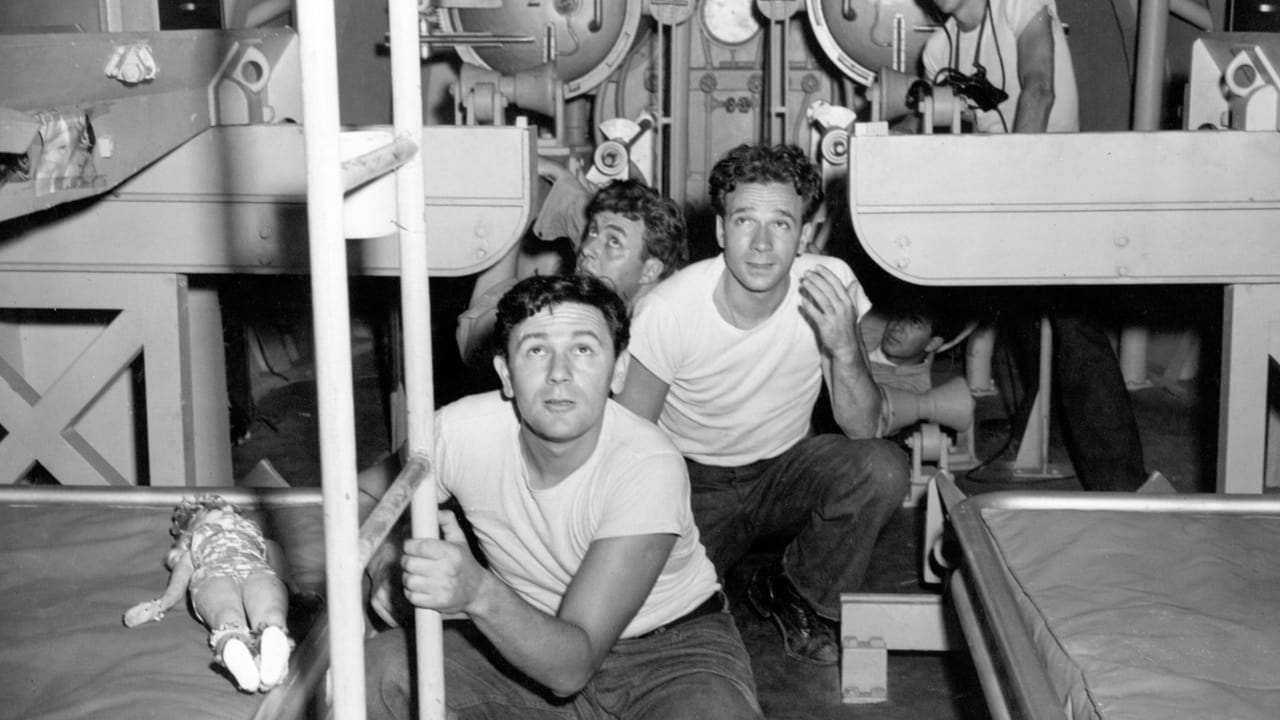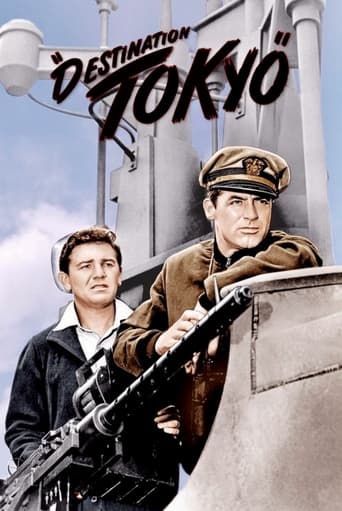



Wonderful character development!
A Disappointing Continuation
The first must-see film of the year.
This is one of the best movies I’ve seen in a very long time. You have to go and see this on the big screen.
View MoreEven though it's Christmas Eve a submarine called the U.S.S. Copperfin sails out of San Francisco in 1943 on a top secret assignment which cannot be revealed until another 24 hours at sea. The commander of this vessel is a man named "Captain Cassidy" (Cary Grant) and like many of the men who have served with him has 5 successful patrols to his credit. However, this specific assignment is far more dangerous than anything any of them could have ever realized and it will also have an immediate impact on the war against Japan. Now rather than reveal any more I will just say that as far as "submarine movies" are concerned this film certainly ranks as one of the better ones out there. Be advised though that it was made during World War 2 and because of that there are some elements of propaganda here and there. Likewise, even though the plot is based on a true event it is also quite evident that there are some typical Hollywood exaggerations here as well. But even so this is still a pretty good film and I have rated it accordingly. Above average.
View MoreI always had misgivings about this movie which I saw sometime on TV in the early 90's. For some reason to me, it didn't seem logical that Cary Grant, of all people, could successfully captain a submarine. Boy, was I wrong. Gone is "Judy, Judy, Judy", and in are mannerisms that make him perfect in this role, if not for that role. He is charming, as usual, but is extremely understated than normal. The light comedian comes out at times, of course, but his oh so recognizable speech pattern doesn't overpower his characterization. He is surrounded by a wonderful supporting cast. I always thought that Dane Clark was brought into Warner Brothers to be another John Garfield, but after seeing them bickering at each other, they were nothing alike. Garfield was cocky but likable, while Clark was a bit tougher and more cynical. Alan Hale, as the cook, is his usual gregarious self, and a very young John Forsythe is recognizable in a small role.There are some wonderfully suspenseful moments involving Japanese mines and the plane explosions, like in "Air Force", are most frightening. One thing that made me a bit uncomfortable were a few speeches of the downside of Japanese life, particularly their treatment of women and the taking of five year old boys to begin their military training. Still, they were much more subtle than presentations of the Japanese as monsters in other World War II movies spouting such silly lines as "OK you Yankee Doodle Dandies, Come and Get Me!" To understand World War II propaganda, one must try and face the facts that not all portrayals of our enemies were totally true. The true danger in the Axis were seeing them as cultured individuals who were capable of great atrocities. Somehow, the Germans got better treatment in the movies than the Japanese did; Their villainy was always revealed to be hidden under the facade of civility and great manners. (Check out Conrad Veidt in "All Through the Night" as evidence of that.) The Japanese were unfortunately usually presented as Barbarians. But for those who like their war villains getting their just reward, take notice of the Japanese pilot who is ungrateful to his American saviors and turns to cheese in the Swiss method after making his ingratitude known to an unfortunate American soldier who has tried to pull him up out of the Pacific. Also, have fun listening to Tokyo Rose who war predictions will turn out to be absolutely false.When Cary Grant says, "I hear that a lot of Japanese are happy to die for their emperor. A lot of them are going to be very happy", I felt a bit uncomfortable. As much as I like to see the enemy stopped, I don't like to see any civilizations being slaughtered because of political differences. Movies like this do make me proud to be an American as long as true American values of peace and prosperity are available to all people. "Destination Tokyo" has great detail of showing life during war on a submarine where men of all walks of life became brothers to fight a battle they truly believed in.
View MoreSuave submarine skipper Cary Grant (as Cassidy) leads a Christian crew from San Francisco to Tokyo Bay, to fight the Godless Japanese. A flag-waver, "Destination Tokyo" sailed into theaters while World War II was being fought. Debuting director Delmer Daves and his cast manage to deliver some engaging performances, despite a stereotyped script, and some occasionally toyish production values. Star Grant is enjoyable, albeit not entirely successful, in an atypical war hero role.Soldiering John Garfield (as Wolf) and Dane Clark (as Tin Can) head up a likable crew. Veteran fellow traveler Alan Hale (as Cookie) goes through the motions, which is enough. Mr. Clark and John Forsythe (as Sparks) make good early career impressions. John Ridgely (as Raymond), Warner Anderson (as Andy), and Tom Tully (as Mike) are also featured. The uncredited cast is noteworthy, including Whit Bissell (as Yo Yo) and Carlyle Blackwell Jr.; the latter's father, Carlyle Blackwell (Sr.), was one of Hollywood's first genuine "superstar" actors.The most amusing "dramatic" interplay culminates with inexperienced William Prince (as Pills) deciding to operate on impossibly doe-eyed Robert Hutton (as Tommy)'s ruptured appendix. Ouch!***** Destination Tokyo (12/31/43) Delmer Daves ~ Cary Grant, John Garfield, Dane Clark
View MoreBy the time of its release of Warner Brothers DESTINATION TOKYO (1943), it was coming across crystal clear; The Allies were in for a long, drawn out war. False notion of a an early end to War, simply because the United States was now involved were certainly cast into the figurative "circular file" of life.The underlying circumstances, although basically the same is in the First World War, were complicated by both the political and geographical situations of World War II. The combatants in the First Conflict were made up of nations that were ruled by a group of cousins, better known as the Royal Families of Europe. The Theatre of War were limited to The Western Front in Europe (France, 1914-1918), the Italian & Austro-Hungarian Front (1914-18) and the Middle East Consisting of the fighting against the Ottoman Turkish Empire by the British and the Arab Militias in Arabia and Palestine (the Holy Land, Israel). By contrast, World War II had military engagement of a truly Global Magnitude. Hence we had major Fronts in Europe (Both Eastern and Western), North Africa, the whole Atlantic via combat from the U Boats, Iran, the China-Burma-India Theatre of War, Southeast Asia in Viet-Nam and Burma, Indonesia and the Australian-New Zealand Theatre, The Island Warfare in Polynesian, Melanesian and Micronesian Island Groups; as well as the whole Pacific.With such an overwhelmingly immense a job to be done (literally do or die, no ifs ands or butts about it), the full and whole hearted support was needed from the entire Nation; and it's obvious that everyone did. From the Soldier, Sailor, Marine, Airmen and Coast Guardsmen on the fronts to the industrial sector with its hard working corps of men and women; all pitched in and in going the extra mile, won the war.Hollywood sure did its part, as no one can deny. And with that, we are brought down to our subject at hand today.OUR STORY In DESTINATION TOKYO we have a feature film which is at once a fine example of top Movie Entertainment, a concise statement of U.S. Policy, a stirring statement of the underlying, unique reasons of our being involved in European and Asian conflicts and an inspirational fictional version of events that have transpired previously. In short, it was at least in part, a propaganda piece par excellence.The ship has a super secret mission, which proves difficult to the veteran submarine crew. Being experienced fighting men, they fail to understand. Passing up the opportunity to sink some of the enemy Japanese shipping is an unthinkable deed to the crew, both officers and enlisted men. The thought surely though silently, must pass through their collective minds; could this Captain Cassidy (Cary Grant) be afraid of combat? Is he filled with cowardice or could it be those unknown orders that are behind his reserved behaviour.Finally the big moment comes and the cat gets let out of the bag. The crew finds out the news that they are on a special mission of reconnaissance; rather than combat. They were to get in close to the Japanese coastline, within Tokyo's port city of Yokohama harbor itself. From there, a landing party of two would go in to the beach property in order to check local topography of the land, weather conditions, tides, local conditions of all types.This seemingly insignificant mission, it turns out, is a necessary step in carrying out the later air raids over the Japanese home islands. This is the very same raid that we have come to know as "the Doolittle Raid." Once the mission has been completed with and the landing party has successfully returned to the sub, they begin their tedious, nerve wracking business of sneaking back out of the chain-link fence protected Tokyo harbor, the Captain proclaims; "The Job's done! Nothing says we can't fight now!" (Or some such) They did and must have sunk half of the Imperial Fleet, in a sort of reverse Pearl Harbor. We can just see the moviegoers rising to their feet and cheering at this scene.The ship returns safely to San Francisco, from which it had come. Cary's wife (Miss Faye Emerson) and family stand waiting on the pier! THE END.The journey across the wide Pacific gave the crew to interact and tell us all about themselves. As was the usual practice, Warner Brothers made sure that the crew was a mixture, sort of like a pound assortment of chocolates. Hence, we have guys from all over: New York, the South, Texas, the Dakotas and California. The excellent work of cast members like John Garfield, Alan Hale, Dane Clark, John Forsythe and Bill Kennedy sparkled.WE must concentrate on Tom Tully's work as the career man Petty Officer, Joe. Through his dialogues with others, as contrasted with the way he eventually pays the ultimate price, makes for an excellent back-drop for expressing what was the difference between our way of life in the U.S.A. and the life of those brought up under a Militarist Totalitarian System. At times, the speeches delivered by the Captain and others may seem to be have been a little much in the post World War II era.But once that one considers the events of 9/11, well ..
View More